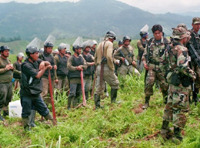Latin America on brink of war
 A threat of wars on the Latin American continent has been markedly increasing. To put it mildly, uneasy relations of Venezuela and Colombia may become one of many. This includes historical ones that for some time were considered frozen.
A threat of wars on the Latin American continent has been markedly increasing. To put it mildly, uneasy relations of Venezuela and Colombia may become one of many. This includes historical ones that for some time were considered frozen.
Now relations between Bolivia and Chile have worsened due to the fact that the latter refuses to provide the first traffic corridor to the Pacific Ocean. Bolivia has lost its corridor back in the late 19th century, having suffered a defeat by one of the best armies in South America - Chilean one.
This had very negative consequences for Bolivia. Its landlocked position has hampered its economic development. The country needed a transport corridor for the export of raw resources.
The experience of losing the Pacific War was still too fresh to hope for a rematch. Not without the help of the Chileans the revenge aspirations of the Bolivians were redirected to the opposite, Paraguayan, side. Bolivians hoped to pave a road for themselves to the Parana River (the second-longest on the continent), which flows into the Atlantic, and solve the problem by building its ports there.
However, Paraguay, with the help of Russian emigre officers, managed to survive the war of 1932-1935 and divide Bolivia. The historic task of getting access to the sea has not been solved.
After that, the problems between Bolivia and Chile began to multiply. Bolivians remembered who has deprived them of access to the sea. In fact, currently the countries are at war and have no diplomatic relations.
The threat posed by the Bolivian leader Evo Morales to arrange a trial at the Hague court have not made much impression on the Chileans. It is hardly likely that the court would rule in favor of Bolivia, which is an ally of the perpetual troublemaker Chavez.
This makes the threat of a war increasingly more prominent. There are some others offended by the Chileans on the continent. For example, Peru, which, as a result of the aggressive policy of Chile, also has lost much of its territory.
Deputy Director of the Institute of Latin America Boris Martynov explained in an interview with Pravda.ru the extent of the possibility of a potential conflict in South America.
"The conflict potential in the region has increased to a certain degree in recent years. It must be remembered that any aggravation on the continent is in one way or another connected with two things. First, this is the interference of third countries that have certain economic interests in one of the two countries. A classic example is the Chaco, or Paraguayan-Bolivian war of 1932-1935. The Americans were the ones to instigate Bolivia against Paraguay. To be precise, it was the Bolivian oil company Standart Oil that had to ensure exportation of Bolivian oil.
Second was an attempt by the authorities of the countries to shift the attention of the population from internal problems to external ones. In this sense the example of Chavez and his allies comes to mind. Take, for example, Nicaragua's Daniel Ortega, who has been contesting Colombia's membership of the three islands in the Caribbean for many years.
Coming back to the issue of Bolivia, we should also note the presence of many internal problems in this country that Morales has been unsuccessfully trying to solve. The current government of Chile and President Piñera are largely to blame for the current Chilean-Bolivian tension. He had an opportunity to not allow the matter become acute. After all, his predecessor Bachelet left him a good inheritance in this sense. She agreed with Morales that she will give him the opportunity to export raw materials mined in Bolivia into one of the ports. However, after Piñera came to office, it was forgotten, which creates a dangerous situation.
However, at this time it is difficult to imagine that even a politician like Morales is able to start a war. The Chileans have repeatedly proven that their army is one of the strongest on the continent, and Bolivians cannot cope with it on their own. Of course, they would have a better chance in the case of a union with Peru, but the fact is that now this country does not seek revenge and such unions. The same can be said about the prospects of escalation between Colombia and Peru. This is the conflict of the mid 1930's that, in fact, has been resolved.
Yet, the relations between Colombia with Chavez and his allies, including Ecuador, are, mildly put, not that rosy. Colombians are unhappy that the guerrillas of the FARC allegedly receive support from Chavez and Correa. In addition, Venezuela has expressed certain claims for a portion of the Colombian coast. Chavez also had territorial claims to another neighbor, Guyana.
Nevertheless, all this does not necessarily mean that tomorrow a war will be launched in the region. However, there are many points of conflict, for instance, Argentina's dispute with Britain over Falklands."
Sergei Balmasov
Pravda.Ru
Subscribe to Pravda.Ru Telegram channel, Facebook, RSS!




